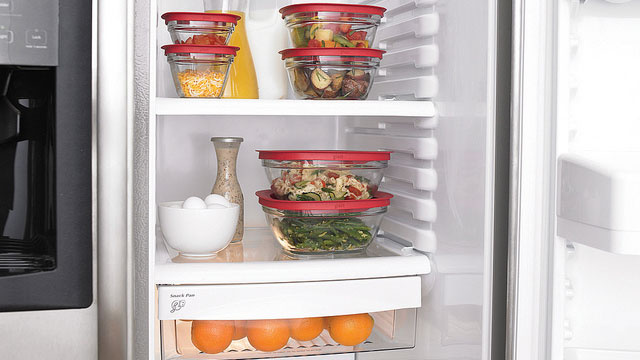The second part of cooking for yourself is meal planning. If you feel as though you simply don't have time to cook, the issue is timing.
The solution is planning.
If your schedule is crazy, you may not have time to cook fresh meals each day. Instead, find a day in your schedule when you can make time to make large batches of food to have for the week. For example, make a big batch of oatmeal, my breakfast bake, or coconut muffins and then you have breakfast for the week. Roast a large pan of vegetables and then you can simply reheat some at a time. If you make a dinner, double or triple the amount you make so that you can have left overs for lunches. You can make a whole pan of chicken at a time and just reheat throughout the week. Make big pots of rice or quinoa and beans. Often it requires just as much time to make a meal as it does to make a double batch of that same meal. Make the double batch and save yourself the time tomorrow.
Set aside some time one day (or even less time on two days) a week and get yourself prepped for your busy days.
Snacks can be treated the same way. Chop up a large amount of easy to snack on veggies so that you can grab some each morning and take them with you. Create cute baggies of fruit and cheese that are ready to go. Make a homemade trail mix with raw nuts and seeds.
These things don't actually take very much time, they just seem overwhelming when you are currently trying to be three places at once. Instead, make meal preparation part of your weekly agenda and then you will find yourself set for the week. When your diet improves, thanks to having healthy food ready to go, your overall health and wellbeing will improve. Your energy levels should be better and you might even feel more even-keeled, all which will help you tackle your busy life.
FOOD SHOPPING
How you purchase your food is important.
One of the best things you can do for the food system and for your pocketbook, is shop local. Go to farmers markets. They are awesome. If you have the time, you can make an entire outing of it. Take the kids, the dog, go with a friend. It is a good time. Sometimes at the end of the day, farmers will even offer up deals on the produce they haven't sold. Also, the food quality is so much better. You want good quality food. It is more bang for your buck. The food is fresher because it was grown locally instead of shipped a great distance. Talk to your farmer and find out about their practices. Usually farmers markets are full of organic (or organic practicing without the certification) farms.
If time is an issue, then you have a few things that can help. For those with the financial means, there are companies now that will home deliver fresh produce to your door. For the majority of people for whom that is not an option, get to know your store. Food shopping can be a very quick thing if you know your store and what you need. I fly through my local health food store because I know that place like the back of my hand. I have a list of what I need and I'm in and out in a flash. Unless I have spare time, in which case I linger and explore because I like food. But that's just me.
And yes, health food stores are your friend. You don't have to buy all their expensive products, but they tend to have the best produce (outside of farmers markets). You need access to good food if you are going to buy good food. Unfortunately, there are food deserts in this country, and that is a whole other conversation. But for most people, good food can be found if you take the effort to look. Farmers markets are becoming prolific and even mainstream stores are improving their produce selections. Shop the perimeters where the whole foods live and learn what days the produce is put out fresh. Usually, the best day is Wednesday.
And this has to be said: prioritize food in your budget. This country is known for spending the smallest percentage of their income on food. That would be an accomplishment if that meant we were eating super high quality food for that price, but we're not. Cultures with much lower rates of obesity and chronic diseases, such as France, spend a higher percentage of their budget on food. They value their food.
And FYI: one of the easiest ways to reduce your cost is to eat less meat. I'm not even talking about being a vegetarian, just substituting a few animal protein meals a week with beans/legumes is a huge money saver. Dried beans and legumes are CHEAP.
SLEEP HYGIENE
Sleep is a big deal. I know that society can sometimes glorify the ability to function on little sleep, but that is not something we should be striving for. Sleep is vital to our health. We will die if we go too long without sleep. Sleep is essential to our immune system, hormone regulation and muscle/tissue repair; do not discredit it. And for the record: caffeine does not literally provide us with energy. It binds to receptors in our brains, thus preventing adenosine from binding to those receptors. When bound to its receptor, adenosine tells the body to slow down nerve cell activity, causing drowsiness. Therefore, the way to think of caffeine is that it blocks you from feeling drowsy; it does not provide your body with more ATP (your cell's energy source). I'm telling you this so that you understand why consuming infinite amounts of caffeine is not a good thing. I'm not against moderate caffeine consumption, as there are some benefits with coffee and tea, but high intakes of caffeine can be very disruptive to your neurotransmitters and should not be seen as a legitimate substitute for sleep.
If you are not getting adequate sleep, there are multiple things to consider. The first, of course, is how much time are you devoting to sleep. If you are only allowing a few hours each night for sleep, this is not enough. I realize that sometimes life circumstances mandate this, but you really will not be able to keep this up long term. I couldn't even begin to address how to do this for everyone because the situations that can lead to lack of sleep time are as varied as there are people on the planet. So I will just say this: I urge you to not accept getting no where near your required sleep as the way it must be. I don't know if this means having to ask for help, dialing back on responsibility, or a massive schedule overhaul, but the first step is identifying this as a need that deserves to be addressed. I'm sure it can feel insurmountable to some, but I think there are a lot of people who have simply accepted their situation as a normal byproduct of a busy life. It shouldn't have to be.
Then there is the issue of quality of sleep. If you are putting in the time, but either having trouble falling asleep, waking up in the middle of the night, tossing and turning etc. then there may be some things that can help. This is the sleep hygiene part. Sleep hygiene is getting more attention these days so you may have heard a bunch of these before, but they do bear repeating:
- Turn off electronics at least an hour before bed.
- Dim the lights with the sunset. You do not need your home to be lit up like an amusement park all evening. Dim the lights on your electronics with the sunset as well if you can.
- Expose yourself to darkness. If you have a yard or a safe space to step outside at night in the dark, this can be very helpful.
- Make a routine at night before bedtime so that your body gets accustomed to it.
- Try to go to bed and wake up at similar hours throughout the week.
- Try teas, tinctures or other herbs that help the body relax for sleep.
- If your mind has trouble turning off, keep a journal at your bedside to write down any pressing ideas and remove them from your thoughts.
- Try nightly meditation. Even while you are in bed. You can purchase guided meditation CDs or find them on youtube to play at bedtime.
- Try healing modalities such as massage, acupuncture or Reiki.
BODY IMAGE
I felt that I had to at least mention this topic since we are talking about lifestyle. The relationship that you have with your body (and thus with your food and eating habits) is so important to your overall wellbeing. It is a little bit tangential to the previous topics, but still very relevant in my view. It is extremely hard to have a healthy relationship with your food if you have a poor relationship with yourself. Many people care about improving their diet and lifestyle because they want to change themselves in some way. But there is a vast difference between wanting to be healthier in order to feel better, and hating your body. Self-love is vital to overall wellbeing and it is also a key component to any lifestyle change. If you are not kind to yourself, it will be very hard to value yourself enough to make lifestyle shifts. It also won't make you happy. If you do not love yourself, then any external changes won't be enough. If you struggle with body image, as so many of us do, I encourage you to work on that first. If you feel as though the problem requires professional attention, I encourage you to seek the care you need.
If this topic is of interest to you, I wrote an article that talks about body image and our relationship to food for Elephant Journal that you can find HERE.
Photo credit: theselfsufficientliving.com






































